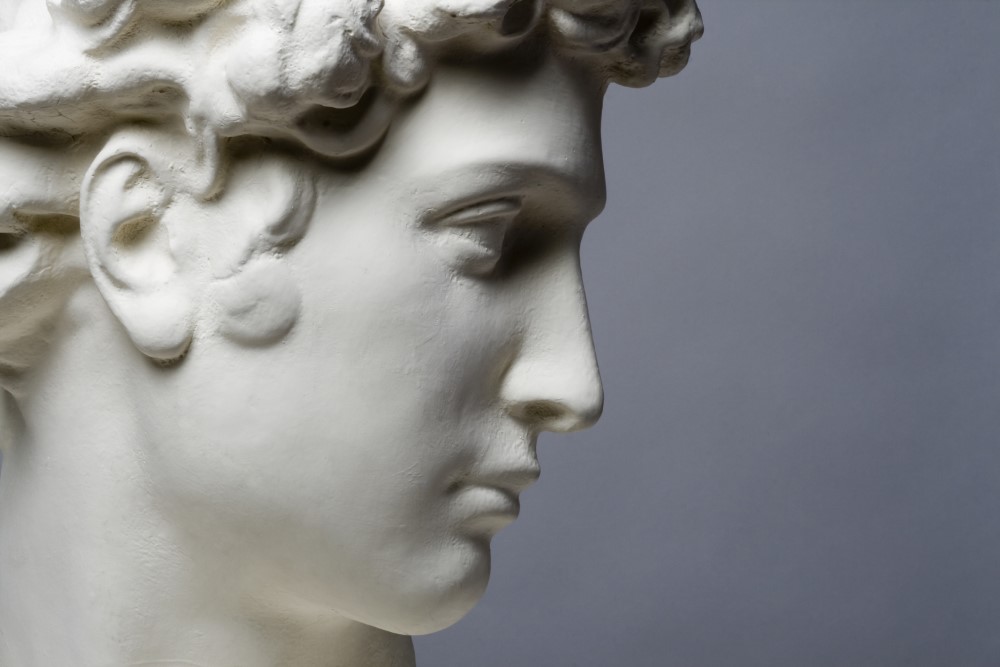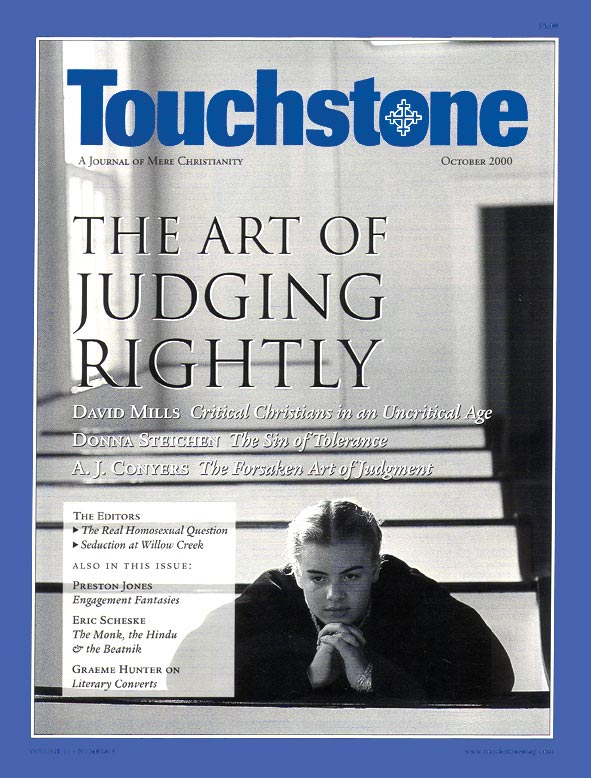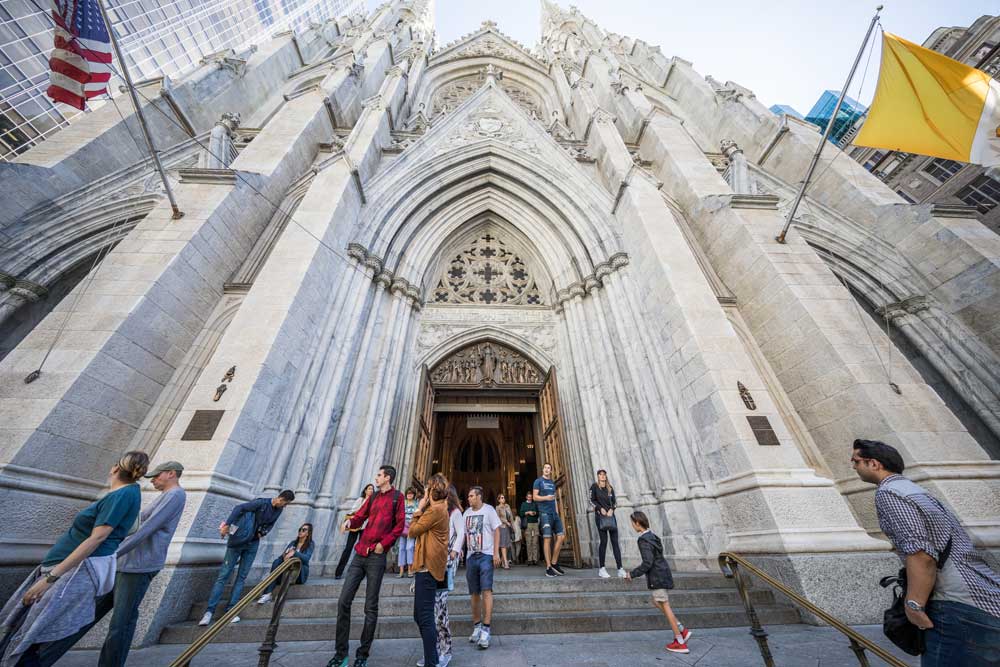Close Your Mind
Critical Christians in an Uncritical Age
by David Mills
G. K. Chesterton once said of his friend H. G. Wells: “I think he thought that the object of opening the mind is simply opening the mind. Whereas I am incurably convinced that the object of opening the mind, as of opening the mouth, is to shut it again on something solid.” (Though we think of him mainly as a science fiction writer, Wells was a great leader of the progressive movements of his day. He was, sexuality aside, the Gore Vidal of the early twentieth century.)
To be open-minded—now usually called “entering the dialogue”—is not necessarily a virtue. The virtue of open-mindedness depends on how far you open your mind and how long you keep it open, and whether you close it when you ought to.
An open hatch on top of a submarine lets in needed light and air—until the submarine dives. An open door in a country house is one thing, an open door in a prison is another. A man may open-mindedly weigh the merits of monarchy, but he may not, without branding himself a moral imbecile, open-mindedly weigh the merits of Hitler’s policies for the Jews.
Thus there is less to be said for open-mindedness than is usually said by modern mainline Christians. It is not at all virtuous to keep your mind continually open, because you are not using your mind as it is meant to be used. You are in fact taking very poor care of it. The mind continually propped open will only collect dust and cigarette butts.
Closed on Something
The mind that is being used will often be closed. If it is working well, it will be closed more often than not. It will have closed on something solid, and be chewing it over. That is what minds do.
This is certainly what the Christian mind does. Christian doctrine and morality are realities. Even the most technical and abstract language points us to realities we can to some extent comprehend and think about. We are not simply presented with a set of random and unreliable data from which we are to figure out as best we can what it all means. God has shown us what is really there.
If this is true, we cannot be open-minded in the usual sense when someone proposes that the reality does not in fact exist. That is something like being open-minded about the existence of a truck bearing down upon you as you cross the street, because someone on the sidewalk tells you, for whatever reasons, that he does not see it.
That people around you don’t see what you see, and therefore call for “open-mindedness,” is not a relevant concern until you know whether you can trust their vision. One cannot trust the man whose sexual life is disordered when he says that Scripture can be read in new and more permissive ways. This is to be open-minded about the existence of a truck bearing down upon you as you cross the street, because a blind man on the sidewalk tells you he does not see it.
You have, these days, the delicate responsibility to say to many advocates of dialogue that their vision cannot be trusted enough for you to talk seriously with them, as if they could see. Because they have blinded themselves, you cannot talk with them in any but a pastoral or an evangelistic way. You may talk to them about their getting glasses, but until they get the glasses (and most will not) you cannot talk to them about a painting they cannot see or a map they cannot read. You cannot argue with them about the merits of the painter or the best way to get home.
Typically, the dialogist will respond to a statement he does not like with: “Well, that’s your opinion.” This is true, if it means “an idea you hold, on which reasonable people with some knowledge of the subject may disagree,” but not true if it means, as it usually does, “an idea for holding which you can make no more than personal claims.” That Bach was a better composer than Beethoven is an opinion; that killing children is wrong is not.
Two Reasons
People believe in this nearly endless open-mindedness for two reasons, I think. First, the modern world, and the liberal Christian with it, assumes that because a few hundred years ago some Christians burned other Christians over small (though not necessarily unimportant) differences in theology, we should not say with complete confidence “On the third day he rose again” or “Thou shalt not commit adultery.”
To avoid religious conflict, we are allowed only to say that the Nicene Creed is true for me, but not that it is true for you, much less that it is true for Muslims and Jews and Buddhists. That this means making statements about the cosmos as if they were only one’s best guess or what one felt at the moment to be true does not bother the liberal Christian.
You cannot make a universal claim like “for us men and our salvation he came down from Heaven” and then say that it is only true for Christians. And in fact, except for some rather muddled people, the dialogist does not contradict himself when he makes these claims, because he does not believe the first to be true. He believes, though he may not admit it because the costs of honesty would be too high, that the Christian claims are just inherited metaphors for universal experiences, which should only be used among Christians and not asserted to others, lest the assertion start a fight.
The obvious response to the dialogist’s belief that truth is too dangerous to assert even if you think you know it, is that Truth exists even if people misuse it. You don’t call off the family’s Christmas feast because Uncle George will drink too much and fall down in the front yard, and Cousin Filbert will eat too much and throw up on the carpet, and Cousin Wilhelmina will set the Christmas tree alight. You simply take precautions. You recognize the temptations you might face—intolerance, say, or fanaticism—and resist them.
A milder sort of liberal will admit that Christians have some unique insight into the truth of things, but insist that we do not see it very well and should not be too sure about it. If we assert the final truth of any biblical teaching, he will argue that the Church has continually revised its teachings in response to new knowledge and to meet new problems.
The obvious response to this is to agree that we see as in a glass darkly, but to note that we do still see. If our knowledge is partial, it is still accurate; one can still build a bookshelf or an internal combustion engine though scientists have still not discovered a unified field theory, or create a vaccine though scientists still do not know how to create life. The question is not what we do not know, but what we do.
Politically Useful
That is the first reason “open-mindedness” appeals: that because certainty is dangerous, we should not be certain even when we are. The second is that it is politically very useful.
I think, though one can never really know, that this opportunism is mostly unconscious. The earnestly open-minded are often fundamentally political creatures who choose among principles according to their usefulness in reaching the goal of the moment, as suggested by the fact that their faith in open-mindedness changes with their political prospects and ideological commitments.
We see this in the secular world, when the people who urge the “just say no” and “zero tolerance” crusades against drug use argue that children will have sex no matter what you say and therefore all we can do is make it safer for them by providing condoms and safe-sex techniques. You will arouse as much wrath by proposing a campaign for chastity as you would by proposing a campaign to teach safe drug use.
We see this in the religious world as well. In the mainline churches, that women ought to be ordained (a controversy the liberals have won) is a matter of an eternal, implacable, unchanging justice, but that sodomy may or may not be permissible (a controversy they have not yet won) is a matter for exploration and dialogue. We must be open-minded about the second, declare these apostles of open-mindedness, who then snap their minds tight shut about the first.
As I have written before, this capacity to switch first principles at need and to switch back again a few seconds later is a key to understanding liberalism, secular and religious. It gives liberals a great advantage in public debate and political processes, when they face people hampered by a commitment to reason. The man without moorings can always run rings around the man who is tied down.
The man who tries to reason from a common ground—that children can say no to sex as they can say no to drugs, for example—finds himself suddenly alone on that ground and being abused from another ground entirely. Should he move to the new ground and try again to reason with his opponent, he will find himself being abused from the first. He cannot win the argument, or usually even get a hearing, because his opponent will never stay put.
More Uses
The strategy of switching first principles has two emotional uses, I think. The first is the advantage of being able to speak on any subject with conviction nearing self-satisfaction, because you are always defending some obvious principle against the infidels. No matter what you want, even if what you want in one area of life contradicts what you want in another, you are always speaking for the right and good and true.
The second is the advantage of being able to switch as desired from idealism to realism, and from crusading to “facing facts.” Both can intoxicate, because both imply your superior morality and wisdom.
In all this there is an irony, not often noticed, given how much the open-minded fear those who sometimes close their minds. The self-consciously open-minded are more likely to persecute others than those of us who think we know the truth, which is to say, know with certainty the things that are certain.
We know the truth because someone (Someone, to be precise) has healed our blindness and said, “Look.” We do not know why others have not been healed, but we are willing to give them time as we ourselves were given time. The man who sings “Amazing Grace” and means it is not likely to persecute those still suffering the blindness he once suffered. (If he has the cure of souls, he may have to discipline them, for their own good and the good of others, but that is a different matter.)
Not believing in revelation or grace (in any but the most metaphorical of senses), the self-consciously open-minded must assume that whatever they do believe must be equally visible to everyone else. Those who do not see it must be willfully and self-servingly blind—homophobes and misogynists and fanatics to whom tolerance cannot be given. And thus the self-declared open-minded often respond to others with a closed mind and a closed fist.
Inconsistently Pluralistic
For some of our dialogists, of course, “dialogue” is a politically prudent synonym for relativism, and most of them combine relativism or “pluralism” in theology with an absolutist passion for their causes and the ideologies that justify them. Their own claims to openness are unjustified, but they nevertheless do not hesitate to divide the sheep of dialogue from the goats of dogmatism.
Thus, for example, a few years ago a liberal Episcopal friar preached an ordination sermon in which he mourned the “discordant voices” who “call for dividing the pure from the fallen, the right from the wrong, the saved from the lost.” They give the “word of judgment rather than the word of forgiveness” and “the word of wrath rather than the word of grace.” But “thanks be to God,” he said, some—people like him—“are of the seeking sort, the gathering sort, the uniting sort.”
He had no problem separating the sheep from the goats, even though dividing sheep from goats is the act he was attacking. The goats are discordant, divisive, judgmental, unforgiving, and wrathful. They do not seek, gather, or unite. They are, to use his own words, the impure, the wrong, and the lost.
The last presiding bishop of the Episcopal Church similarly warned of those “backing themselves into tighter and tighter circles of self-justification and self-righteousness, attempting to write their prejudices into canon law, pursuing legalisms at the expense of compassion, understanding, and mercy.” They “want very much to settle our differences and to settle them with a vengeance. There seems, for instance, to be a resurgence of a biblicism which thinks that a simple, unequivocal ‘the Bible says . . .’ will settle our differences.”
These people—left unnamed but easily identified—do not know how complex and ambiguous the world is. But they are not only naïve or ignorant, they are also self-justifying, self-righteous, prejudiced, legalistic, uncompassionate, unmerciful, vengeful, biblicist, and simple-minded. As a friend put it, such people are treated as “brain dead Catholics or Shiite Evangelicals.”
Recently, a leading Episcopal biblical scholar declared that “Some of us, I fear, rather like the prospect of schism.” William Countryman, whose book, Dirt, Greed and Sex, made the peculiar argument that because the Lord told St. Peter that he had made all things clean, Christians could commit sodomy, went on to say that the desire for schism “indulges the propensity we share with all biblical peoples to (if I may borrow a biblical phrase) ‘go whoring after idols.’”
“We make up our mind,” he continued, “exactly what value is important enough to count for more than the true God’s will that ‘they all may be one.’ And we then devote all our energies to serving that one ideal.” It was more difficult and more faithful “to seek the virtues of faith, hope, love, and humility on which the true unity of the church is founded.”
His subjects—again unnamed but easily identified despite the misleading “we”—care more for their idols than for the theological virtues. They lack humility and choose their own way over God’s explicit instructions.
I suppose, to be fair, that if pressed he would claim that his criticism also applied to people of his own party, the moral innovators. But perhaps only if pressed, he not being recorded to have made the same arguments for unity when three years ago the Episcopal Church required everyone to accept the ordination of women. (That innovation was not an idol preferred to unity but a mandate of justice, a distinction made on no apparent criterion other than the innovators’ power and will to enforce their view.)
In any case, here again the sheep are clearly separated from the goats. The latter are not only schismatics, but idolaters.
I doubt many liberals realize the conflict between their attacks on the orthodox for having principles and their own equally decided assertion of their own principles. For most, I suspect, the movement is by now unconscious, though I would not, were I them, assume it to be innocent.
Untrue Caricatures
The goats, you will have noticed, are those who have closed their minds on something solid. Here, I think, the liberals have made one serious mistake, in not seeing that one may have closed one’s mind because one first had it truly open.
A popular psychological tool called the Meyers-Briggs Type Inventory describes how people relate to the world. It includes four scales between contrasting ways in which people prefer to act. On one scale, some people are “judging” and others “perceiving.” Judging people like to decide and act as soon as possible. Perceiving people like to keep getting more information.
Js, as they are called, put everything in its place. Ps leave everything open. Js have neat desks and like rules and do everything ahead of time. Ps have messy desks, dislike rules, and do everything at the last moment. Js love to make their world neat and orderly, Ps do not try. Js see the need for action, Ps see the other side of the question.
If the friar, Bishop Browning, and Prof. Countryman are right, orthodox believers must be “judging” and liberals “perceiving.” The orthodox give simple answers, liberals accept the complexity and ambiguity of life. The first are shackled by inherited prejudices and rules, the second open to the leading of the Holy Spirit. Orthodox believers are dogmatic and exclusive, liberals open and inclusive. The first believe in proclamation, the second in dialogue.
I have been told by experts that I am, in the Meyers-Briggs jargon, “a hard P.” (I have never taken the test, as a matter of principle, having a dislike of what a friend calls “voodoo for intellectuals.” But people insist on telling you what you are, and the one time I brought home a description of my supposed type, my wife started laughing and said, “They’ve got your number.” She, a “J,” did not entirely mean that as a compliment.)
I would much rather learn more about something than make a decision. My desk is messy, I dislike rules, and I do nearly everything at the last minute. I do not mind if everything isn’t neat, I am instinctively uncomfortable with dogmatism, I am perfectly comfortable with ambiguity, and I see the other side (or sides, often enough) of the question. I am by nature liberal.
Yet I also believe that Scripture answers many questions very clearly, I trust the guidance of the church’s Tradition even when it is obscure, I say the Nicene Creed without crossing my fingers, and I think much of religious liberalism not only wrong but foolish. And I am an orthodox Christian, not in spite of being a “hard P,” but because I am one.
A Complex World
I agree with the former presiding bishop that the world is complex. The questions and problems we face are often difficult and ambiguous and the answers inevitably painful. We are blinded by our own sins and failings and the limitations of our time and culture. The answers to many questions are not simple or obvious. I feel this deeply, I suspect rather more deeply than he does.
And that is why I turn to Scripture and Tradition. I have looked at the world as open-mindedly as I could, and found good reason to shut my mind on certain truths, not least the trustworthiness of Scripture and Tradition, as justifying closing the mind to their competitors.
I turn to Scripture because I believe, on good evidence, that God has spoken there. To dismiss what he has said with slogans like “complexity” and “ambiguity” and warnings about “biblicism” and tales of people using the Bible to hurt their enemies, shows that you simply aren’t listening. As Ronald Knox once wrote, “It is easy to suspect simplicity in your opponent when the simplicity really lies in the facts.”
It is not very bright to stand pondering the ambiguities of human communication when someone yells “fire” and dashes for the door, especially if you can see the smoke. It is not wise to doubt your wife’s “I love you” because you know enough psychology to wonder how pure and disinterested it really is. Sometimes people do mean what they say.
I turn to Tradition because only in the great stream of believers going back to the apostles do we find the insights and discoveries, the accumulated wisdom, the experiments successful and unsuccessful, that can balance and correct our own weaknesses and most grievous faults. If the world is ambiguous and complex, a wise man, or even a simply prudent one, will get all the help he can.
It is not very bright to trust to your own devices and ignore the grizzled old guide when wandering at night through an alligator-infested swamp. It is foolish, when learning any craft, from writing to wood carving, to ignore the craftsman’s advice and try to learn it by yourself.
In the end, the stereotype best describes not the orthodox but those who use it. As Bishop Browning and his comrades use them, “complexity” and “ambiguity” are really very, very simple ideas, ideas that take no account of the real ambiguity of human knowledge. They are magic words they use to banish any troublesome claim that an idea they dislike may be true.
Religious liberals cannot understand that Christianity is complex because it is both simple and complex. Even its ambiguity is ambiguous. We see in a mirror darkly, as St. Paul said, but we do see in a mirror darkly. Sometimes we see better than others.
Sometimes we are certain, sometimes we are not. Sometimes we see better than other Christians—though rarely, if ever, better than the consensus of the Christians who came before us. Sometimes we see very well, sometimes almost not at all, but in both cases we know how well we see and how firmly we can insist on the accuracy of our vision.
The orthodox Christian is not someone who sees only one side of the question. He is someone who sees whatever sides there are. Sometimes there are two sides to a question, sometimes several, but sometimes only one.
Christianity’s Complexities
The liberal has tried to solve the problems of our limited vision and avoid the dangers of intolerance through relativism and pluralism, but as his own rhetoric and actions show, he cannot do so with any success, because men must always believe something to be true, and must speak for and act upon these truths even though others object and protest. What is denied as conscious principle quickly reappears as unconscious ideology.
The willfully open mind is, as we have seen, often the most tightly shut. The sophisticate is often as sure that he has the truth as any fundamentalist, and more eager to impose his truth on others than most fundamentalists ever think of being.
The liberal cannot help being alternately too relativist and too intolerant, because he cannot see the truth and know what truth demands of those who have been allowed to see it, both in clarity and in kindness. The orthodox believer sees the truth and sees the dangers, and avoids the dangers by the practice of charity. That is the only way he can see the truth with confidence and love those who do not see it. In living the life of charity, he can close his mind and open his arms.
David Mills has been editor of Touchstone and executive editor of First Things.
subscription options
Order
Print/Online Subscription

Get six issues (one year) of Touchstone PLUS full online access including pdf downloads for only $39.95. That's only $3.34 per month!
Order
Online Only
Subscription

Get a one-year full-access subscription to the Touchstone online archives for only $19.95. That's only $1.66 per month!
bulk subscriptions
Order Touchstone subscriptions in bulk and save $10 per sub! Each subscription includes 6 issues of Touchstone plus full online access to touchstonemag.com—including archives, videos, and pdf downloads of recent issues for only $29.95 each! Great for churches or study groups.
Transactions will be processed on a secure server.
more from the online archives
calling all readers
Please Donate
"There are magazines worth reading but few worth saving . . . Touchstone is just such a magazine."
—Alice von Hildebrand
"Here we do not concede one square millimeter of territory to falsehood, folly, contemporary sentimentality, or fashion. We speak the truth, and let God be our judge. . . . Touchstone is the one committedly Christian conservative journal."
—Anthony Esolen, Touchstone senior editor










